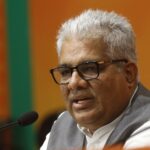As Bihar prepares for the Assembly elections later this year, the Election Commission of India (ECI) is rolling out several initiatives that will make a debut in the state.
“The ECI is focusing on making voting easier, faster and fairer, and the electoral process more inclusive,” ECI assistant director Apurva Kumar Singh said. “We’re introducing changes based on past feedback, many debuting with the Bihar elections.”
For the first time, polling booths will feature mobile deposit facilities – a response to complaints from voters struggling to manage their phones. “This will ease their burden, especially for those voting alone,” Singh said.
The ECI will also cap the number of voters per polling station at 1,200, down from 1,500, to “cut congestion, reduce waiting times and speed up voting”.
Additional booths will be set up in high-rise buildings and residential colonies, targeting densely populated urban pockets, a tactic borrowed from recent Lok Sabha successes in many cities.
Voter Information Slips are also getting a makeover. The ECI expects to trim 20-30 seconds off each voter’s processing time by enlarging the serial and part numbers for easier readability, leading to shorter queues and smoother voting.
Updating the electoral roll is on the ECI’s priority list, with a first-of-its-kind Special Summary Revision (SSR) planned ahead of by-elections – the first in nearly two decades. To address outdated entries, the ECI will utilise the Registrar General of India’s (RGI) death registration database.
“Using death registration data from the RGI, followed by door-to-door checks, we will keep updating the electoral roll. Deletion is a sensitive issue. We won’t remove names without ground verification,” Singh said.
For the first time, booth-level agents, including those from 11 Bihar-based parties, have been trained at the India International Institute of Democracy and Election Management (IIIDEM) in , where all the election-related officials are trained.
“Political parties are our biggest stakeholders, along with the voters,” Singh said. The canvassing distance norm has been slashed to 100 meters from polling station entrances to balance visibility and order.
The ECINET dashboard, a single-app solution replacing over 40 existing platforms, will also launch during the Bihar elections. Duplicate EPIC number issues have also been resolved, ensuring every voter gets a unique identifier, the ECI officer said.
Election staff are not being left behind. Booth-level officers (BLOs) will now carry standard photo ID cards – another first – to foster trust and ease public interaction. “Not having proper IDs was a hurdle,” Singh said.
Apart from this, over 3,000 booth-level supervisors, including those from Bihar, have been trained at IIIDEM, with plans to train one lakh more nationwide. Similarly, training for a batch of police officers has been conducted at the institute.
The ECI assistant director said that the poll body is also considering orientation for media personnel throughout the country at IIIDEM, in batches, starting with Bihar-based journalists to sharpen election reporting and voter education efforts.
The electoral body aims to increase voter turnout to the national average of 66.10%, up from Bihar’s 56.28% in the last Lok Sabha elections.







